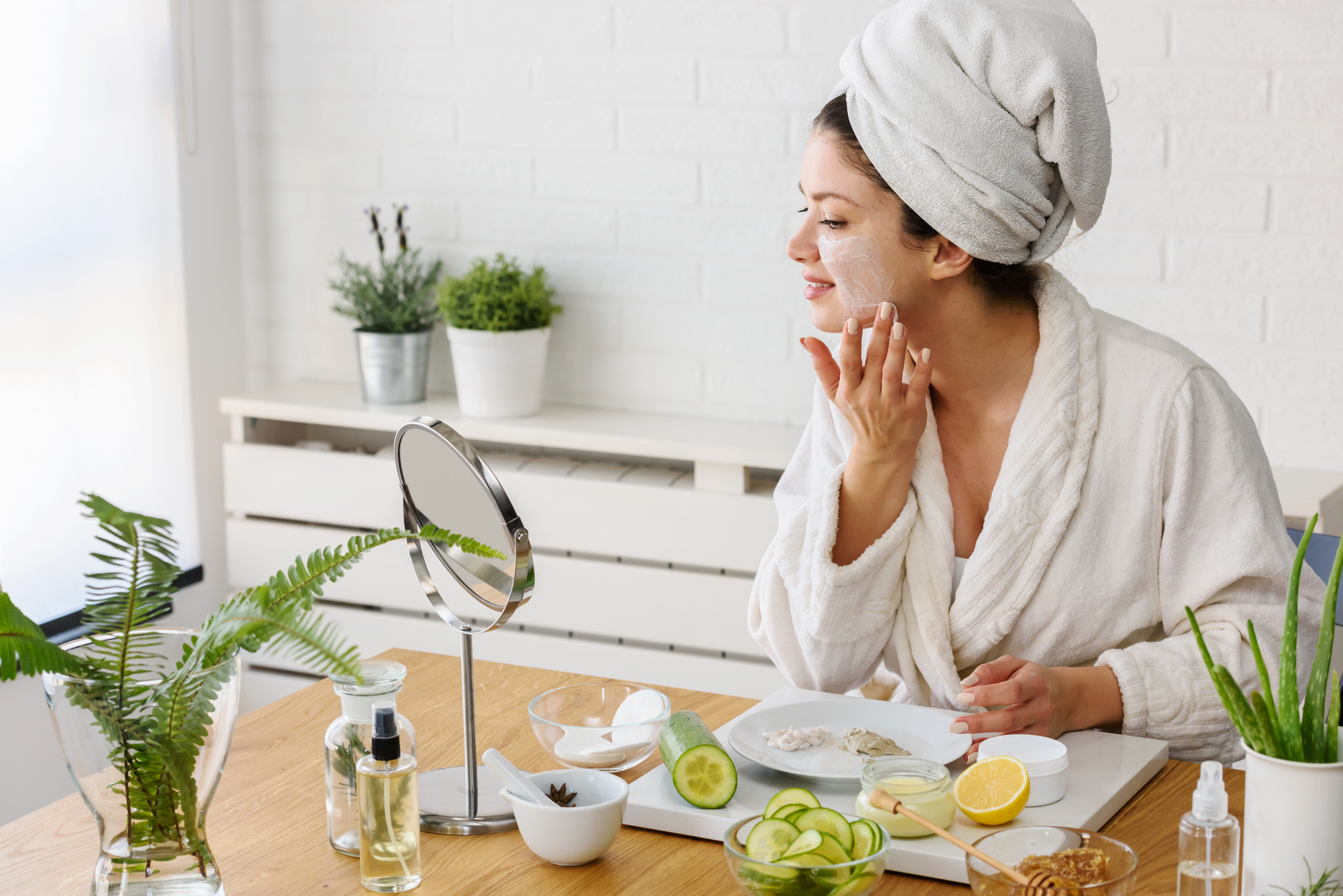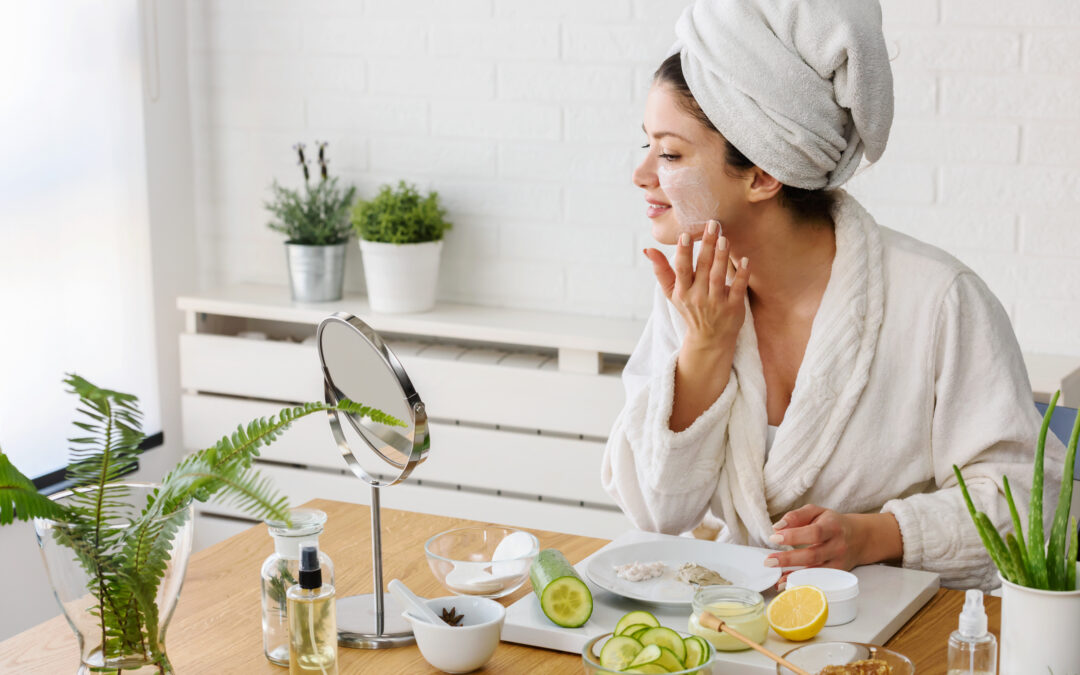The dark side of the natural beauty community
When does a preference for homemade beauty products turn into science scepticism?
Words by Emily Cronin

What’s good for your roasties is good for your face, so the saying doesn’t go. Yet a growing segment of skincare fans is swapping retinols and hyaluronic serums for ‘natural’ alternatives. Think beef tallow face balm, cocoa powder dry shampoo, coconut oil makeup remover, and so on.
That’s right: the latest it-ingredients in beauty owe less to the lab than to the kitchen. Take it from TikTok, where devotees testify to the life changing effects of adding pantry staples into their beauty routines. Search ‘apricot kernel oil’ and you’ll find women slathering it onto their legs in lieu of shaving cream or running it through their hair as a deep-conditioning treatment. Coconut oil shows up in makeup-removal videos.
And then there’s beef tallow, the more neutral/less ick name for rendered beef fat. In clip after clip, women smear the creamy balm – made by melting beef fat, straining it to remove impurities and whipping it with essential oils – onto their cheeks while lauding its benefits. Benefits like vitamins A, D, E and K, and fatty acids that make it a rich moisturiser for non-oily skin. Plus, it’s ‘natural’. ‘If you can’t eat your skin care,’ one woman advises as she swipes a dollop from her tallow jar, then pops it into her mouth, ‘you should not be putting on your face.’ Never mind that many of the products come with a distinct whiff of roast dinner. As one fan told the New York Times, ‘smelling a little beefy might just be the cost of having a glowing face.’
What’s happening here? Certainly coconut and apricot oils feature in countless skincare products from established brands, and plenty of people have sworn by beef tallow soaps and balms for years. But seeing such widespread adoption of the homemade approach in 2025 points to broader social trends.
@naraazizasmith making a bigger batch as we speak🫶🏽 #easyrecipes #skincare #cleanbeauty #fypツ #marriage #fromscratch #coupletok ♬ O mio babbino caro (Gianni Schicchi:Puccini:Adami) - AllMusicGallery
And to TikTok, of course. Nara Smith, the Mormon influencer and tradwife known for her from-scratch breakfast cereals and other such laborious cooking videos, makes her own coconut-oil and brown-sugar lip scrub. When she shared a clip of model husband Lucky whipping up a batch of beef-tallow face cream, it looked wholesome. To some, even convincing (if it’s good enough for those cheekbones…).
Smith’s videos reach a population primed to be receptive to her ‘homemade is best’ message by similar content from other tradwives and homesteaders. But watch enough videos about coconut oil and beef tallow, and you’ll begin to notice something else: influencers in ‘Make America Healthy Again’ (MAHA) hats talking about the importance of eliminating industrial chemicals from your routines.
The tradwife/homesteader/wellness-girlie to pro-Trump content pipeline is real. MAHA, an offshoot of the MAGA movement, is anti-fluoride, anti-big-pharma, vaccine-sceptical, pro-raw milk and (especially) pro-Trump. Making swaps from conventional products to identifiably ‘natural’ ones plays into MAHA followers’ suspicion of institutions and anything made in a lab. Considered in that context, beef tallow looks less like a wonder product, more like a gateway to a xenophobic, science-sceptical worldview. Now with a beefy glow. Yum?
There’s an evangelical, even puritannical undercurrent to the trend – an obsession with purity and all things ‘natural’ over modernity, innovation and convenience. After all, there are plenty of shelf-stable, efficacy-tested products available for under a tenner at Boots. Which lends the whole enterprise a whiff of anti-feminism. It’s hard to argue that many of the people patiently stirring saucepans of rendered beef suet and cheerfully DIYing their skincare value women’s leisure time.
‘Smelling a little beefy might just be the cost of having a glowing face.’
Not that there’s always a political ideology behind product choices. For some, there’s a novelty factor at play. For others, swapping standard skincare products for choices like coconut oil and beef tallow could be a reaction to years of 12-step skincare routines, as they’re drawn to the straightforward ease of single-ingredient solutions. ‘Maybe this is a boomerang moment,’ says Brittany Luse, host of NPR’s It’s Been a Minute podcast, ‘where people have reached a saturation point with doing these intense multi-step skincare routines, and now want something simple’.
Is any of it effective, though? In the case of beef tallow, the answer is a solid… maybe. Depending on your skin. Tallow is comedogenic, meaning it’s likely to block pores. ‘Certainly a lot of our clients prefer ingredients to be vegan and suitable for congested, blemish-prone skin which beef tallow wouldn’t be,’ says Eilidh Smith, founder of London-based facial and skincare clinic Skinwork.
‘We like to see proven and tested ingredients, formulations and technology – no fads or unproven trends. Of course there are lots of ingredients which originate from nature but are then developed, tested and formulated to be more efficacious for the skin and safe.’
All of which reminds me of a conversation I had with my dad years ago. He was an eye surgeon and glaucoma specialist, and medical marijuana was in the news as a balm for all kinds of issues, including glaucoma. Is it actually therapeutic, I asked him. He thought for a moment before answering. ‘You know, it probably does have some positive effects,’ he said before pausing to finish. ‘But not as many as prescription eyedrops.’
I’ll stick with the best skincare science can offer, thanks. And save beef drippings for my next batch of roast potatoes.
Photo: Getty

